Faslane Peace Camp is a permanent peace camp sited alongside Faslane Naval base in Argyll and Bute, Scotland. It has been occupied continuously, in a few different locations, since 12 June 1982. In 1984, the book Faslane:Diary of a Peace Camp was published, co-written by the members of the peacecamp at the time. There is also a secondary site on Raeberry Street in North Glasgow.

Occupy Los Angeles is one of the many occupy movements in the United States, following the original Occupy Wall Street (OWS) protest. Participants of Occupy L.A. first met at Pershing Square on September 23, 2011. Activists came to consensus to occupy public space in solidarity with the growing movement. Occupiers first marched in Los Angeles on September 24, 2011. They next protested a fundraiser being held in Hollywood at the House of Blues for President Obama. Participants met at Pershing Square every subsequent night to plan out the logistics of an occupation set to begin on October 1, 2011. After debating potential locations around Los Angeles, people decided on the lawns around City Hall. Tents first manifested on October 1, 2011 on the grounds of Los Angeles City Hall.

Occupy Portland was a collaboration that began on October 6, 2011 in downtown Portland, Oregon as a protest and demonstration against economic inequality worldwide. The movement was inspired by the Occupy Wall Street movement that began in New York City on September 17, 2011.

Occupy Seattle was a series of demonstrations in Seattle, Washington, United States in 2011 and 2012, that formed part of the wider Occupy movement taking place in numerous U.S. and world cities at that time. The demonstrations were particularly focused on the city's downtown area including Westlake Park and Seattle City Hall; their stated aim was to oppose wealth inequality, perceived corporate greed, and corruption in the banking and economic systems of the United States.

Occupy Boston was a collective of protesters that settled on September 30, 2011 in Boston, Massachusetts, on Dewey Square in the Financial District opposite the Federal Reserve Bank of Boston. It is related to the Occupy Wall Street movement that began in New York City on September 17, 2011.

The Occupy movement was an international populist socio-political movement that expressed opposition to social and economic inequality and to the perceived lack of real democracy around the world. It aimed primarily to advance social and economic justice and different forms of democracy. The movement has had many different scopes, since local groups often had different focuses, but its prime concerns included how large corporations control the world in a way that disproportionately benefits a minority, undermines democracy and causes instability.

Occupy Buffalo was a collaboration that included a peaceful protest and demonstrations which began on October 1, 2011, in Buffalo, New York, in Niagara Square, the nexus of downtown Buffalo opposite the Buffalo City Hall. It is related to the Occupy Wall Street movement that began in New York City on September 17, and called for economic equity, accountability among politicians and ending lobbyist influence of politicians. Protesters camped overnight in Niagara Square as part of the demonstration.
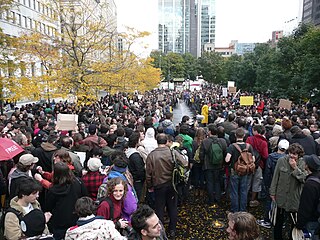
Occupy Canada was a collective of peaceful protests and demonstrations that were part of the larger Occupy Together movement which first manifested in the financial district of New York City with Occupy Wall Street, and subsequently spread to over 900 cities around the world.

Occupy London was a political movement in London, England, and part of the international Occupy movement. While some media described it as an "anti-capitalist" movement, in the statement written and endorsed by consensus by the Occupy assembly in the first two days of the occupation, occupiers defined themselves as a movement working to create alternatives to an "unjust and undemocratic" system. A second statement endorsed the following day called for "real global democracy". Due to a pre-emptive injunction, the protesters were prevented from their original aim to camp outside the London Stock Exchange. A camp was set up nearby next to St Paul's Cathedral. On 18 January 2012, Mr Justice Lindblom granted an injunction against continuation of the protest but the protesters remained in place pending an appeal. The appeal was refused on 22 February, and just past midnight on 28 February, bailiffs supported by City of London Police began to remove the tents.
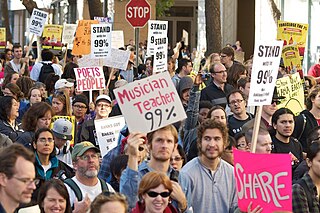
Occupy Oakland refers to a collaboration and series of demonstrations in Oakland, California, that started in October 2011. As part of the Occupy movement, protestors have staged occupations, most notably at Frank H. Ogawa Plaza in front of Oakland City Hall.
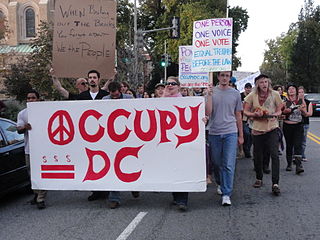
Occupy D.C. was an occupation of public space in Washington, D.C. based at McPherson Square and connected to the Occupy movements that sprung up across the United States in Fall 2011. The group had been demonstrating in McPherson Square since October 1, 2011, and in Freedom Plaza since October 6. Despite crackdowns on other Occupy projects across the country, federal authorities claimed on November 15 that they have no plans to clear McPherson Square Park. The National Park Service decided against eviction after meeting with activists and discussing health and safety conditions.

Occupy Melbourne was a social movement which took place from late 2011 to mid 2012 in Melbourne, Australia as part of the global Occupy movement Participants expressed grievances concerning economic inequality, social injustice, corruption in the financial sector, corporate greed and the influence of companies and lobbyists on government. Protests began on 15 October 2011 in City Square with a 6-day-long protest encampment, from which people were forcibly evicted by Victoria Police at the request of the City of Melbourne CEO on 21 October 2011. From 2 November 2011, Occupy set up camp in Treasury Gardens before being moved on from that location in December. A significantly diminished number of protesters set up camp at Father Bob's church at his invitation until his retirement in January 2012. Physical manifestations of the movement had largely dissipated by mid-2012 though it adopted a strategy of decentralisation and became influential in the creation of new community networks, affinity groups and collectives.

The Occupy movement began in the United States initially with the Occupy Wall Street protests in New York City, but spread to many other cities, both in the United States and worldwide. This list article is an alphabetical, non-chronological summary of Occupy events that have occurred in cities in the United States.
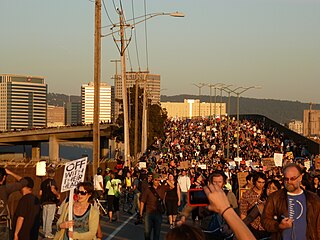
The following is a timeline of Occupy Oakland which began on Monday, October 10, 2011, as an occupation of Frank H. Ogawa Plaza located in front of Oakland City Hall in downtown Oakland, and is an ongoing demonstration. It is allied with Occupy Wall Street, which began in New York City on September 17, 2011, and is one of several "Occupy" protest sites in the San Francisco Bay Area. Other sites include Occupy San Francisco and Occupy San Jose.

Occupy Baltimore was a collaboration that included peaceful protests and demonstrations. Occupy Baltimore began on October 4, 2011, in Baltimore, Maryland, in McKeldin Square near the Inner Harbor area of Downtown Baltimore. It is one of the many Occupy movements around the United States and worldwide, inspired by Occupy Wall Street.

Occupy Edinburgh was a protest against economic and social inequality as part of the global Occupy movement.

Occupy Ottawa was a mostly peaceful, leaderless, grassroots and democratic protest movement that began on Confederation Park in Ottawa, Ontario, on October 15, 2011. The movement's slogan "Home of the global revolution in Ottawa" refers to its inspiration by, and association with, the Arab Spring, Occupy Wall Street and the global Occupy Movement, which protests growing economic inequality, corporate greed, and the influence of corporations and lobbyists on electoral politics and government. Occupy Ottawa seeks global economic, social, political and environmental justice.

Occupy Minneapolis (OccupyMN) is a grassroots collaboration that began in October 2011 with a series of demonstrations in Minneapolis, Minnesota. Protesters have staged numerous occupations, most notably of the Hennepin County Government Center plaza.
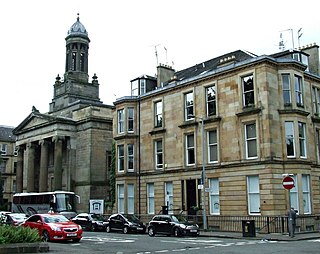
Kelvingrove is a neighbourhood in the city of Glasgow, Scotland. It is situated north of the River Clyde in the West End of the city, and directly borders Kelvingrove Park to the north and the grounds of the Kelvingrove Art Gallery and Museum to the west. Its other boundaries are not precisely defined, but roughly correspond to Sauchiehall Street to the south opposite the Sandyford neighbourhood, and the Charing Cross area to the east.

Squatting in Scotland is criminalised by the Trespass Act 1865. Following the Highland Clearances, land raids occurred across rural Scotland in the late nineteenth and early twentieth centuries, for example in Vatersay and Knoydart. More recently there have been land occupations as both road protests and as part of the Occupy movement. Baile Hoose was occupied during the 2021 United Nations Climate Change Conference in Glasgow.



















